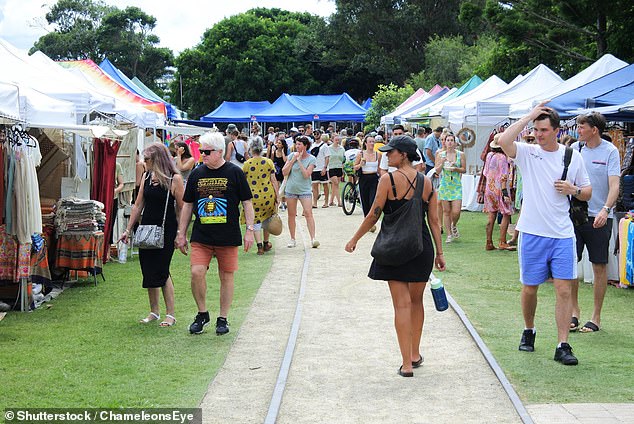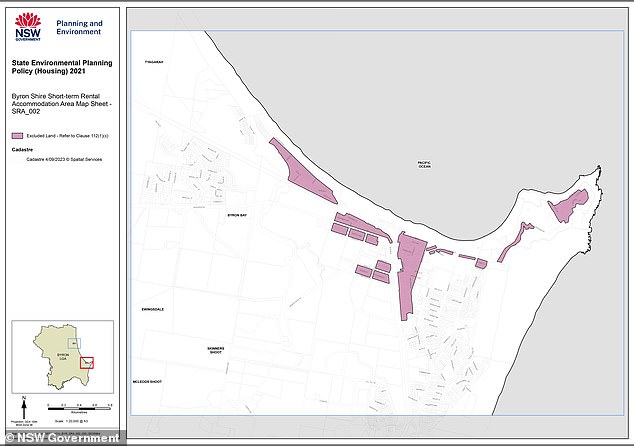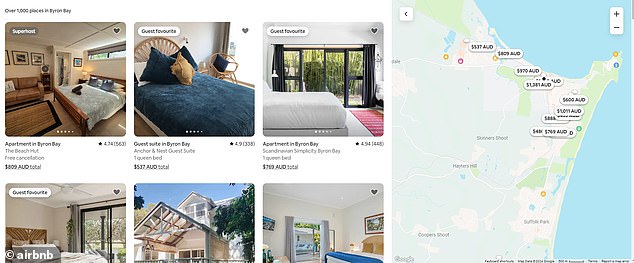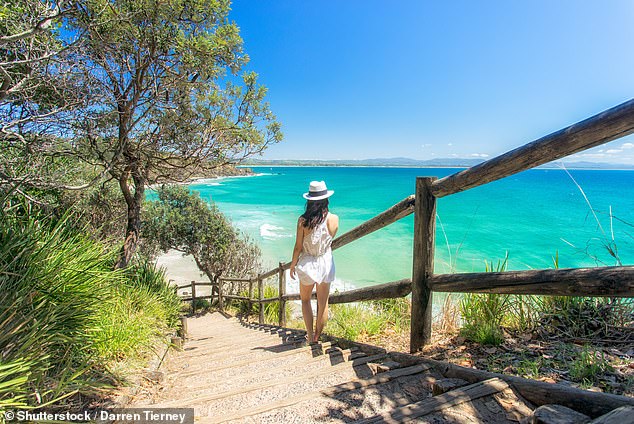A massive rule change could spell bad news for the hordes of tourists visiting Byron Bay, as a stricter limit will be applied to short-term holiday rentals.
From Tuesday, holiday home owners will be banned from renting out their homes to tourists for more than 60 days a year, a third of the already restrictive 180 days currently observed by some homes in the hotspot of northern New South Wales.
The controversial new rule had been pushed by the local council for many years, which wanted restrictions limiting the amount of unhosted short-term rental accommodation (STRA), news.com.au reported.
Residents, who believe STRA properties have made permanent rentals in the area unaffordable and limited in number, have welcomed the new restriction, but others believe the reform will “devastate the economy”.
The bustling coastal city relies heavily on the tourism industry and attracts more than two million tourists each year.
The decision, which was made last year, is the first 60-day restriction anywhere in New South Wales amid hopes the change will have a positive impact on the long-term rental market.
Ballina MP Tamara Smith took to social media on Monday to express her hopes for a stricter limit after “a decade-long fight for Byron Bay”.
“I hope it works… that we see thousands, or hundreds, of entire houses coming onto the private rental market,” he said.
Short-term rentals (STRAs) in Byron Bay are feared to become more expensive when the 60-day limit on renting a property begins on Tuesday (picture a tourist looking at Watego Beach, Byron Bay)

More than two million Australian and international tourists flock to the Byron Bay region each year and their money supports local employment (pictured, Byron Bay Regional Markets)
“We know they are going to be expensive, but we are the only local government area in the entire state doing this trial… and we really want it to be a success,” Ms Smith wrote.
The new limit was prompted by the area’s housing shortage and homelessness problem, which is one of the worst in Australia.
When an annual survey and count of homeless people sleeping rough across the state was carried out in February, a staggering 348 people were found in Byron Bay, a 16 per cent increase on last year.
The city of Sydney had the fewest, with 208 people.
The rise in rough sleepers, combined with the fact that Byron Bay has one of the highest numbers of short-term rental properties in New South Wales (8.5 per cent), has residents hoping the new cap will see holiday homes enter the long-term rental market.
But many homeowners believe this will not solve Byron Bay’s housing crisis, especially as some areas are exempt from the rule.
Beachfront properties, homes in the Byron Bay CBD and those in the prestigious Watego’s Beach precinct are exempt from the new limit.
Some of the exempt “back streets” have always been the most affordable for tourists, and there are now fears that these properties will see their prices rise, especially as these areas will soon be allowed to operate without limits.

There are areas (in purple) exempt from the new limit and soon these parts of the region will be able to operate without restrictions. There are fears that prices will rise
Michael Crosby, head of public policy for Airbnb Australia and New Zealand, told the Daily Mail that caps for Australia do not solve housing issues.
“Night-time restrictions, both locally and internationally, have not worked to improve housing affordability or supply,” he said.
‘In New York City, where short-term rentals have been effectively banned, hotel prices have skyrocketed and rental availability and affordability have not improved.
‘Tourism will suffer as guests will have less affordable accommodation options.’
Crosby said Airbnb guests in Byron Bay spent a staggering $200 million in the community in the 12 months to March 2023.
“And it helped support 800 local jobs, while empowering local hosts to generate additional income in the midst of a cost of living crisis,” he said.
Mr Crosby suggests one way the NSW government could increase the supply of affordable housing is to have tourists pay a “small fee”.

It is believed that the majority of unhosted holiday homes listed on Airbnb in Australia are primarily used as second homes by their owners, so it is highly unlikely that they will ever enter the long-term rental market. Pictured are current Airbnb listings in Byron Bay
It is also believed that many properties available on Airbnb are primarily used as vacation homes for the owner, so it is highly doubtful that they will ever enter the long-term rental market.
Daily Mail Australia has contacted Byron Bay Mayor Michael Lyon for comment.


